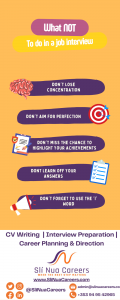Eight things not to do in a job interview
Q: Can you give me some ‘must not do in a job interview’ pointers? I fear that I have built up some bad habits over the years and I would like to start eradicating them. It almost feels like I need a total reset. Your pointers might kickstart me? (OK, email).
- Don’t go looking for a special tone of voice or and enhanced style of delivery. You’ll tie yourself up in knots. In your heroic effort to sound good, you’ll lose your flow. To turn this into a positive piece of advice, trust the language you use every day, give or take.
- Don’t lose concentration. When working with candidates, I notice they sometimes lose concentration midway through an answer. It feels like this has got worse since COVID-19, though I hasten to add I have no scientific base to support that assertion. They start off great guns, only to slowly lose momentum as they figure out where they might go next with the answer. I have found that when you remind candidates to maintain concentration, they often do. Those wandering minds of ours can play havoc anywhere, including in a job interview.
- Don’t write your answers down beforehand and learn them off. Even if you somehow manage to remember them, they will sound unconvincing – written and spoken communications are two very different things. To reiterate what I said in Point 1 above, trust the language you use every day. By all means, prepare some examples and stories you plan to relate, but hoping that you will remember them word for word will waste your time and throw you off course.
- Don’t aim for perfection. You’re not perfect, nor will your answers be. Don’t be afraid to tell them where you may need some assistance in the role, or where you have struggled in the past, because the person who doesn’t need assistance or hasn’t struggled in the past hasn’t crossed the threshold of a workplace yet.
- To underline to the previous point, don’t fool yourself into believing that they’re looking for the perfect candidate. That candidate simply does not exist. Nobody has everything. Why should you try to present yourself as the candidate who miraculously breaks the mould?
- Don’t forget that the stories you tell about your career should, by and large, show you in a good light. They should highlight your achievements and your attributes. Where possible, select stories and examples that ended up well for you, even after perhaps some uncertainty, as mentioned in Points 4 and 5.
- Don’t forget to use the ‘I’ word. You’re not representing your department in this meeting. You are pitching to be the successful candidate. In my experience, candidates use ‘we’ far more than they should and ‘I’ far less than they should.
- Don’t forget to smile. I know that sounds twee, forgive me. What I’m saying is that you should not lose sight of the fact that they are hoping to hire a real, living and breathing, person. Give them reason to believe that you will bring some warmth and humanity to the workplace when you get the role. That is often under-estimated by candidates. Even bosses want to enjoy their workplaces, you know.
Featured image courtesy of Pixabay.
Need job interview training? Go HERE for all types of interview
Need our help? Complete this form below and we will get back to you


